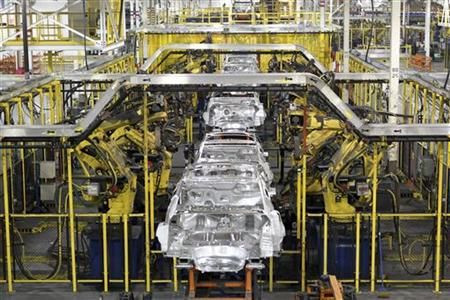Opioid Crisis: Overdose Deaths Increased As Auto Plants Closed

KEY POINTS
- 990,000 people are employed in auto plants, down from 1.3 million in 2000
- Auto plant closures often come as a surprise to workers
- Researchers compared the number of opioid deaths from 1999 to 2016 in 112 counties with at least one auto plant in 1999
A study released Monday indicates fatal opioid overdoses increased markedly among adults in U.S. communities following the closure of a vehicle assembly plant.
The study published in JAMA Internal Medicine found opioid overdose deaths increased 85% in counties where plants closed – and it didn’t matter whether the opioids were legally prescribed or illicitly obtained.
“From 1999 to 2016, automotive assembly plant closures were associated with increases in opioid overdose mortality. These findings highlight the potential importance of eroding economic opportunity as a factor in the U.S. opioid overdose crisis,” said the researchers – Dr. Atheendar Venkataramani of the University of Pennsylvania Perelman School of Medicine, UPenn statistician Elizabeth Blair and Rourke O’Brien.
"The study is important because it shows that when economic opportunities collapse, it not only has consequences for people's economic wellbeing but it might adversely affect their health too," Venkataramani told CNN. "Economic opportunity matters for our health, and as the forces that are shifting economic opportunities for people are continuing to evolve, we have to think about how policies can both make people resilient -- from a health sense -- to the negative changes that might happen, and we also have to think about what types of policies on the economic side may actually give people opportunities, which may also bolster their health."
The researchers looked at data from 1999 through 2016 on adults ages 18 to 65 in 112 counties with factories, primarily in the South and Midwest, including at least one auto assembly plant in 1999. The counties represented 2.7% of the total U.S. adult population and 3.4% of the total number of opioid deaths nationwide.
The Centers for Disease Control and Prevention reported 70,237 people died nationally from drug overdose deaths in 2017, with the total from 1999 to 2017 hitting 702,000.
Fewer than 50 automotive assembly plants currently operate in the United States, employing more than 990,000 workers as of November, down from peak employment in 2000 of around 1.3 million.
The researchers noted automotive assembly plant closures are culturally and economically significant events that affect a defined population and often come as a surprise. They also noted the opioid crisis has grown in tandem with the decline in overall U.S. manufacturing in the last two decades.
“Our findings, combined with a growing body of research demonstrating adverse associations between trade-related industrial decline and drug overdose mortality, lend support to the view that the current opioid overdose crisis may be associated in part with the same structural changes to the U.S. economy that have been responsible for worsening overall mortality among less-educated adults since the 1980s,” the researchers said, noting the Midwest and South suffered the most manufacturing losses, resulting in declines in the standard of living and overall economic status.
© Copyright IBTimes 2024. All rights reserved.






















